

Great Britain and Ireland, 1600–1800 A.D. Great Britain and Ireland, 1400–1600 A.D. The Great Chain of Being. Undefined "The Courtier disdaineth the citizen;The citizen the countryman;the shoemaker the cobbler.But unfortunate is the man who does not have anyone he can look down upon.
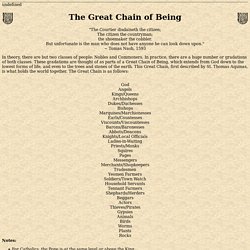
"~ Tomas Nash, 1593 In theory, there are but two classes of people: Nobles and Commoners. In practice, there are a huge number or gradations of both classes. GodAngelsKings/QueensArchbishopsDukes/DuchessesBishopsMarquises/MarchionessesEarls/CountessesViscounts/ViscountessesBarons/BaronessesAbbots/DeaconsKnights/Local OfficialsLadies-in-WaitingPriests/MonksSquiresPagesMessengersMerchants/ShopkeepersTradesmenYeomen FarmersSoldiers/Town WatchHousehold ServantsTennant FarmersShephards/HerdersBeggarsActorsThieves/PiratesGypsiesAnimalsBirdsWormsPlantsRocks Notes: For Catholics, the Pope is at the same level or above the King.Speaking of clergy, the Church hierarchy is actually separate from the secular hierarchy.
Back. Tillyard and the Chain of Being. The Chain of Being: Tillyard in a Nutshell The scholars E.
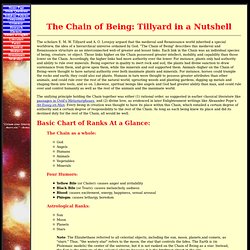
M. W. Tillyard and A. O. The unifying principle holding the Chain together was either (1) rational order, as suggested in earlier classical literature like passages in Ovid's Metamorphoses, and (2) divine love, as evidenced in later Enlightenment writings like Alexander Pope's An Essay on Man. Basic Chart of Ranks At a Glance: The Chain as a whole: God Angels Humans Animals Vegetables Minerals Four Humors: Yellow Bile (or Choler): causes anger and irritability Black Bile (or Tears): causes melancholy, sadness Blood: causes excitement, energy, happiness, sexual arousal Phlegm: causes lethargy, boredom Astrological Ranks: Sun Moon Planets Stars Note: The Elizabethans referred to all celestial objects, including the sun, moon, planets,and comets, as "stars. " Introduction to the Renaissance. Life in Elizabethan England. Written and edited by Maggie Secara 11th Edition Spring 2011 Newly expanded incorporating all previous editions & appendices.
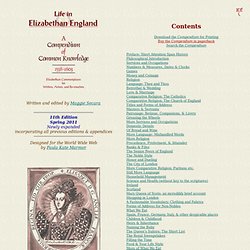
BBC Radio 4 - Shakespeare's Restless World - Episode guide. List of time periods. The categorization of time into discrete named blocks is called periodization.
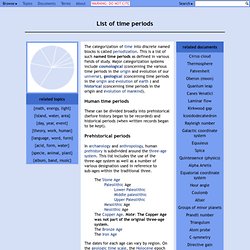
This is a list of such named time periods as defined in various fields of study. Major categorization systems include cosmological (concerning the various time periods in the origin and evolution of our universe), geological (concerning time periods in the origin and evolution of earth ) and historical (concerning time periods in the origin and evolution of mankind). Human time periods These can be divided broadly into prehistorical (before history began to be recorded) and historical periods (when written records began to be kept). Prehistorical periods In archaeology and anthropology, human prehistory is subdivided around the three-age system. The dates for each age can vary by region. Historical periods Full article ▸ eHistory.com: World History Timelines. Scottish Historical Timeline. Macbeth l Historical Background l Elizabethan World Order.
Elizabethan World Order This theory, based on the Greek philosopher Aristotle’s concept of the universe, was of great importance to Shakespeare’s contemporaries and was used by him in developing events in his plays.
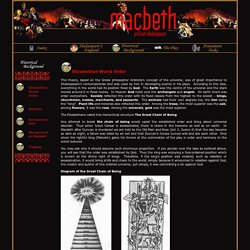
According to this idea, everything in the world had its position fixed by God. The Earth was the centre of the universe and the stars moved around it in fixed routes. In Heaven God ruled over the archangels and angels. On earth there was order everywhere. Society reflected this order with its fixed classes from the highest to the lowest – kings, churchmen, nobles, merchants, and peasants. High position (such as a King, Nobleman or General) could expect (owing to a change in fortune) to suffer some disappointment or “fall”.
Queen Elizabeth 1. The first Queen Elizabeth, whose name has become a synonym for the era which she dominated (1558-1603), was born in 1533 to Henry VIII and Anne Boleyn.
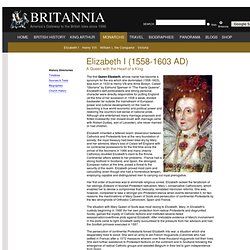
Called "Gloriana" by Edmund Spenser in "The Faerie Queene", Elizabeth's deft politicalskills and strong personal character were directly responsible for putting England (at the time of her accession in 1558 a weak, divided backwater far outside the mainstream of European power and cultural development) on the road to becoming a true world economic and political power and restoring the country's lost sense of national pride. Although she entertained many marriage proposals and flirted incessantly (her closest brush with marriage came with Robert Dudley, earl of Leicester), she never married or had children.
Her first order of business was to eliminate religious unrest. The situation with Mary Queen of Scots was most vexing to Elizabeth. As they say, the rest is history. Elizabeth was a master of political science. Elizabeth I: An Overview (BBC)